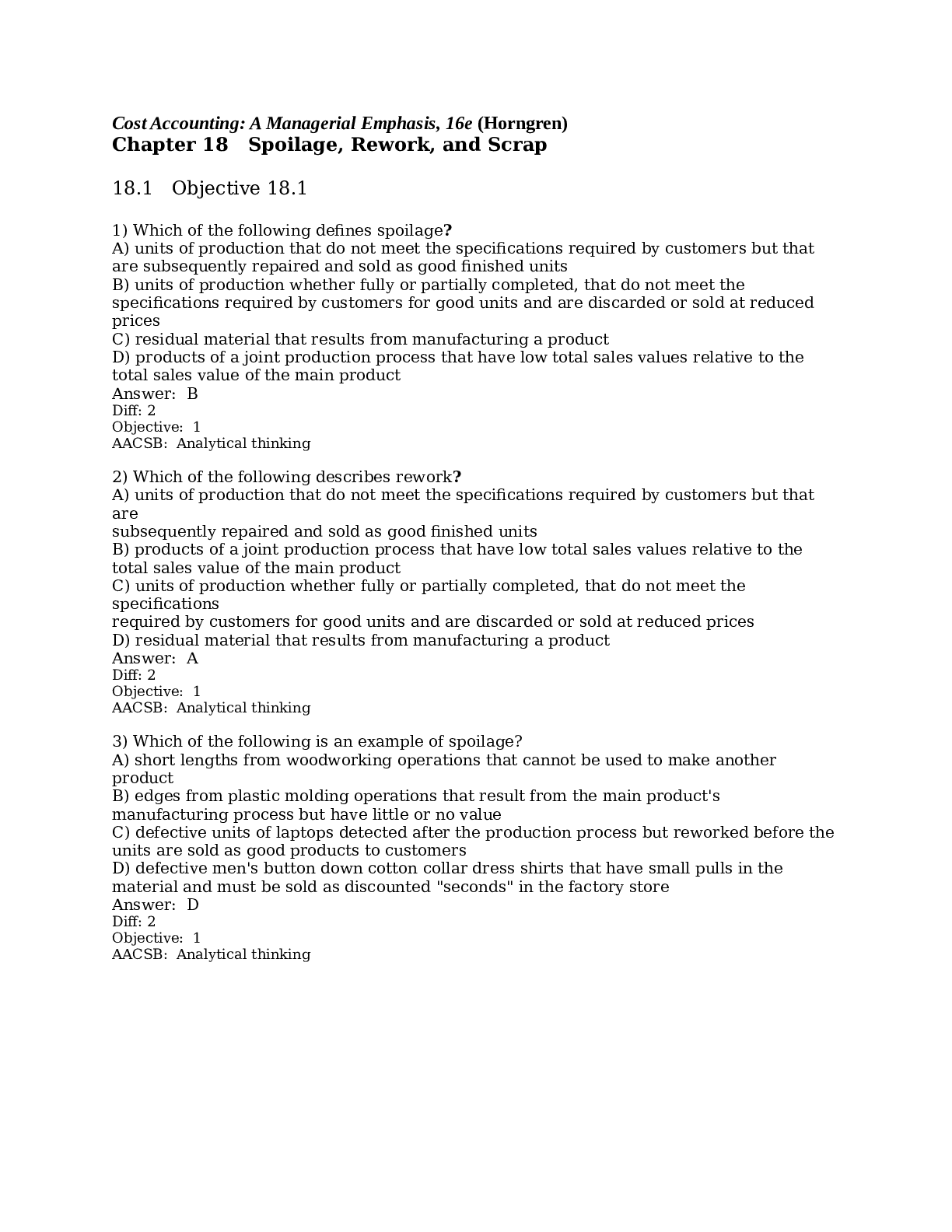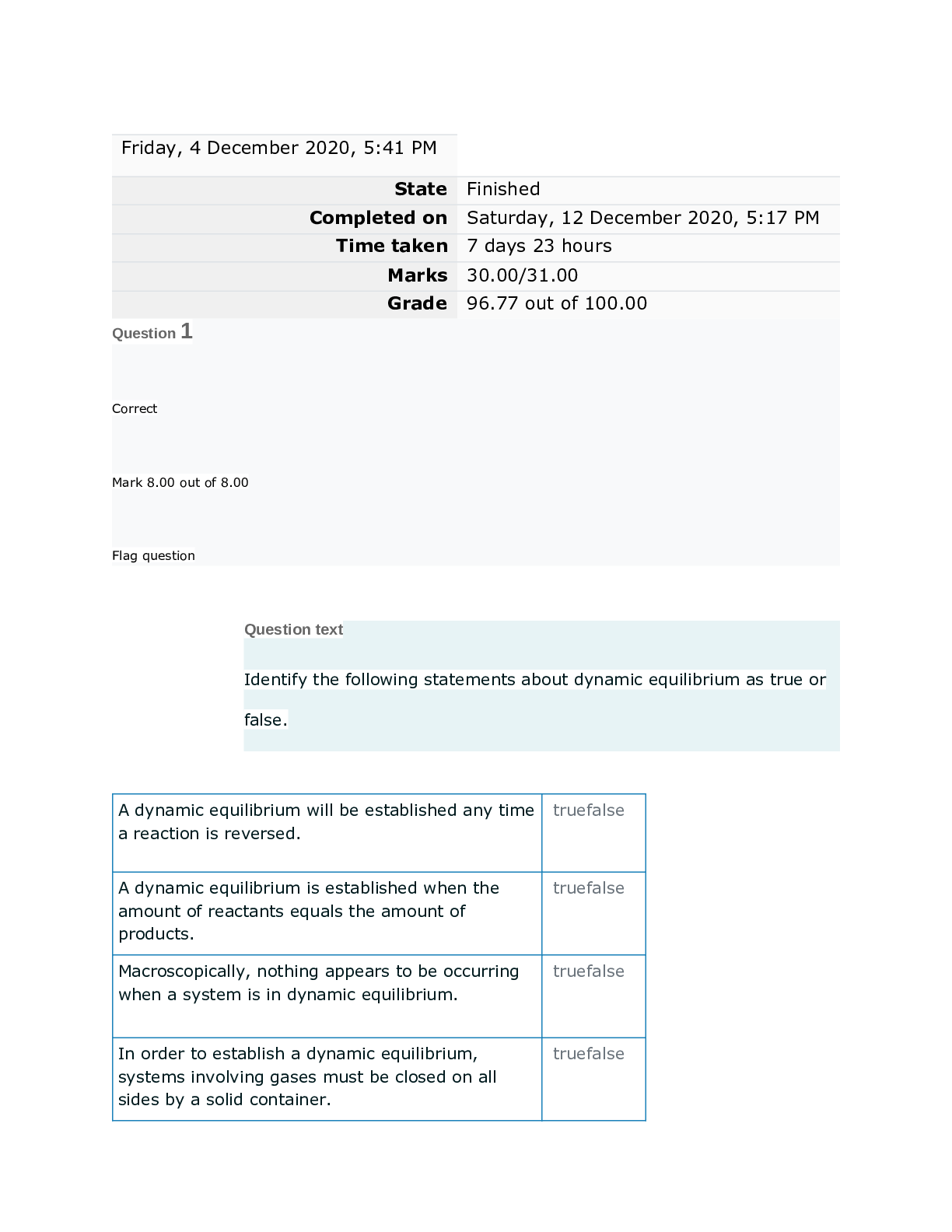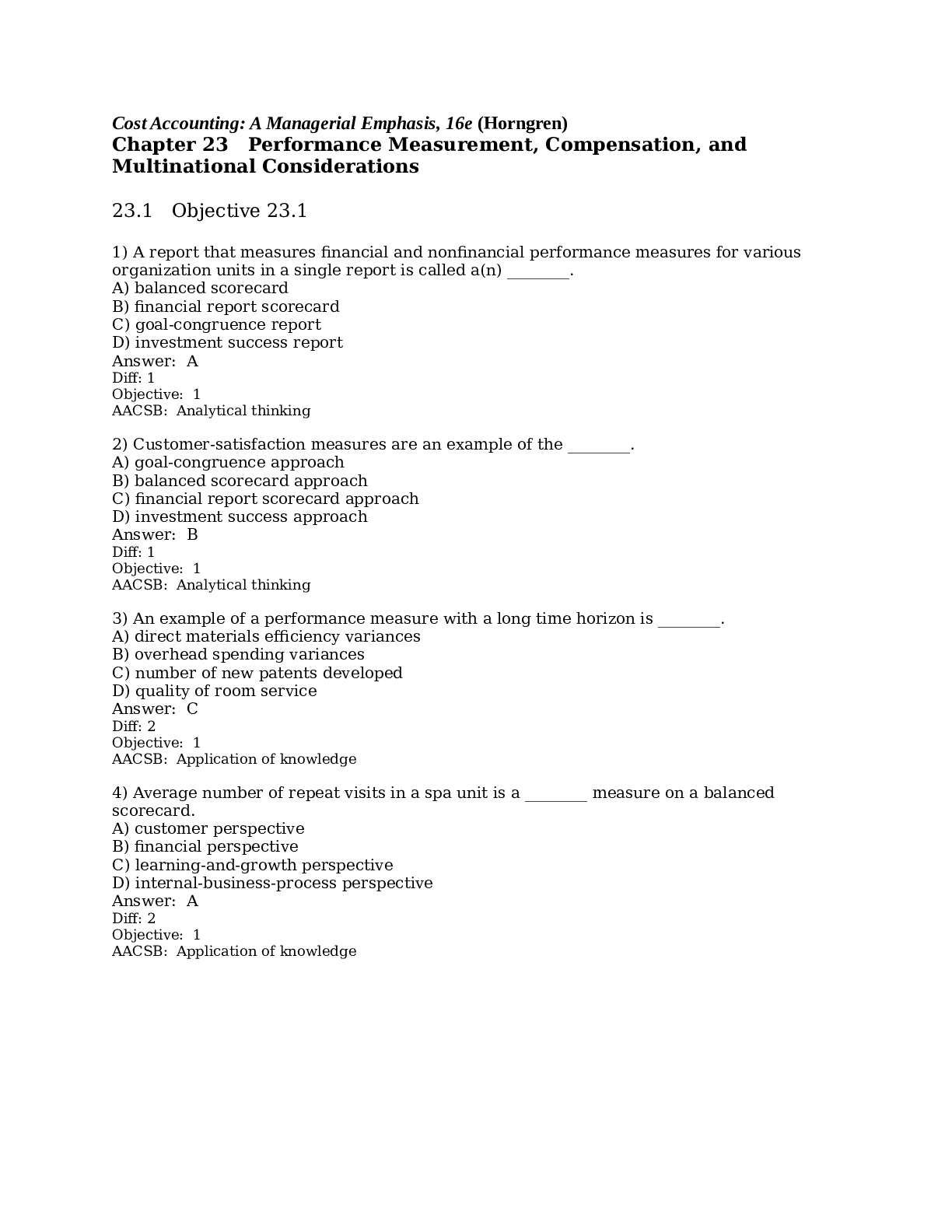Financial Accounting > QUESTIONS & ANSWERS > University of Minnesota, Duluth ACCT 3201 chapter 9 Inventory Costing and Capacity Analysis QUESTION (All)
University of Minnesota, Duluth ACCT 3201 chapter 9 Inventory Costing and Capacity Analysis QUESTIONS WITH VERIFIED SOLUTIONS
Document Content and Description Below
Cost Accounting: A Managerial Emphasis, 16e (Horngren) Chapter Invent9ory Costing and Capacity Analysis 9.1 Objective 9.1 1) Which of the following costs is inventoried when using variable costing... ? A) rent on factory building B) electricity consumed in manufacturing process C) sales commission paid on each sale D) advertising costs incurred for the product Answer: B Diff: 1 Objective: 1 AACSB: Application of knowledge 2) Which of the following costs is inventoried when using absorption costing? A) variable selling costs B) fixed administrative costs C) variable manufacturing costs D) fixed selling costs Answer: C Diff: 1 Objective: 1 AACSB: Analytical thinking 3) Which of the following best describes how fixed cost are treated in a variable cost method? A) They are part of the product cost B) They are excluded from inventory cost and are treated as period costs C) They are allocated to the product cost using a denominator-level capacity choice D) They are classified as nonmanufacturing costs Answer: B Diff: 1 Objective: 1 AACSB: Analytical thinking 4) ________ is a method of inventory costing in which all variable manufacturing costs and all fixed manufacturing costs are included as inventoriable costs. A) Variable costing B) Mixed costing C) Absorption costing D) Standard costing Answer: C Diff: 2 Objective: 1 AACSB: Analytical thinking5) Which of the following is true of absorption costing? A) It expenses marketing costs as cost of goods sold. B) It treats direct manufacturing costs as a period cost. C) It includes fixed manufacturing overhead as an inventoriable cost. D) It treats indirect manufacturing costs as a period cost. Answer: C Diff: 2 Objective: 1 AACSB: Analytical thinking 6) Which of the following is true of variable costing? A) It expenses administrative costs as cost of goods sold. B) It treats direct manufacturing costs as a product cost. C) It includes fixed manufacturing overhead as an inventoriable cost. D) It is required for external reporting to shareholders. Answer: B Diff: 2 Objective: 1 AACSB: Analytical thinking 7) In ________, fixed manufacturing costs are included as inventoriable costs. A) variable costing B) absorption costing C) throughput costing D) activity-based costing Answer: B Diff: 1 Objective: 1 AACSB: Analytical thinking 8) ________ method includes fixed manufacturing overhead costs as inventoriable costs. A) Variable costing B) Absorption costing C) Throughput costing D) Activity-based costing Answer: B Diff: 1 Objective: 1 AACSB: Analytical thinking 9) Which of the following costs will be treated as period costs under absorption costing? A) raw materials used in the production B) sales commission paid on sale of product C) depreciation on factory equipment D) rent for factory building Answer: B Diff: 2 Objective: 1 AACSB: Application of knowledge 10) Under absorption costing, fixed manufacturing costs ________. A) are period costs B) are inventoriable costs C) are treated as an expense D) are sunk costs Answer: B Diff: 1 Objective: 1 AACSB: Analytical thinking11) ________ is a method of inventory costing in which only variable manufacturing costs are included as inventoriable costs. A) Fixed costing B) Variable costing C) Absorption costing D) Mixed costing Answer: B Diff: 1 Objective: 1 AACSB: Analytical thinking 12) Variable costing regards fixed manufacturing overhead as a(n) ________. A) administrative cost B) inventoriable cost C) period cost D) product cost Answer: C Diff: 1 Objective: 1 AACSB: Analytical thinking13) AAA Manufacturing Inc, makes a product with the following costs per unit: Direct materials $180 Direct labor $20 Manufacturing overhead (variable) $30 Manufacturing overhead (fixed) $130 Marketing costs $75 What would be the inventoriable cost per unit under variable costing and what would it be under absorption costing? A) $180 for variable costing and $305 under absorption costing B) $230 for variable costing and $305 under absorption costing C) $230 for variable costing and $360 under absorption costing D) $200 for variable costing and $305 under absorption costing Answer: C Explanation: Variable costing: $180 + $20 + $30 = $230 Absorption costing: $180 + $20 + $30 + $130 = $360 Diff: 2 Objective: 1 AACSB: Application of knowledge 14) Time Again, LLC produces and sells a mantel clock for $100 per unit. In 2017, 42,125 clocks were produced and 37,958 were sold. Other information for the year includes: Direct materials $43 per unit Direct manufacturing labor $5 per unit Variable manufacturing costs $3.50 per unit Sales commissions $14.50 per part Fixed manufacturing costs $65.00 per unit Administrative expenses, all fixed $37.50 per unit What is the inventoriable cost per unit using variable costing? A) $66.00 B) $51.50 C) $48.00 D) $103.50 Answer: B Explanation: Variable costing considers all variable manufacturing costs as inventoriable costs. Therefore, in this case, direct materials, direct manufacturing labor, and variable manufacturing costs will be considered as inventoriable cost. The total inventoriable cost = ($43 + $5 + $3.50) = $51.50 Diff: 2 Objective: 1 AACSB: Application of kno [Show More]
Last updated: 2 years ago
Preview 1 out of 76 pages

Buy this document to get the full access instantly
Instant Download Access after purchase
Buy NowInstant download
We Accept:

Reviews( 0 )
$13.00
Can't find what you want? Try our AI powered Search
Document information
Connected school, study & course
About the document
Uploaded On
Jul 09, 2021
Number of pages
76
Written in
Additional information
This document has been written for:
Uploaded
Jul 09, 2021
Downloads
0
Views
120









.png)

.png)





.png)


.png)
.png)




